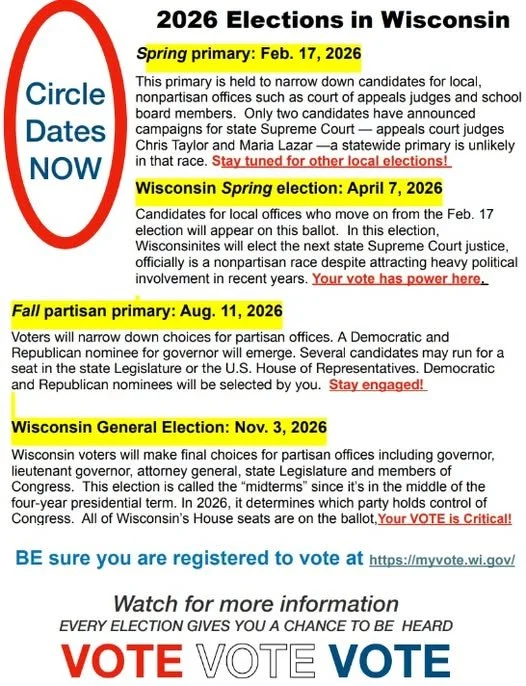General Election Information
Recruiting Candidates for Local Office
October 2, 2023
Recruiting and nurturing candidates for local office are two of the most important roles a local Democratic party can play. Electing officials who uphold and advance Democratic party values and principles at the community level is critical to the health of our democracy and our society.
City council, county board, township board, school board and more: No elected office is “too small” to fill with responsible, civic-minded citizens committed to promoting justice and opportunity for everyone in their communities.
Besides providing valuable service to their communities, local officeholders also gain the experience to move on to higher offices at the state or national level, if they wish.
Whether you want to nurture community members to run for office, or you’re thinking of running yourself, you’ll need information about resources. Here are a few places to find help for first-time candidates:
· Wisconsin Progress is a Wisconsin-based candidate recruitment and training organization dedicated to advancing the progressive movement and electing leaders to champion our most important causes. Select the “Trainings” link from the top menu of the Wisconsin Progress website for the latest information on training opportunities.
· Emerge Wisconsin is an organization that recruits, trains and provides a powerful network to Democratic women who want to run for office. Select the “Candidate Training” link at the top of the Emerge Wisconsin website to apply for the six-month, cohort-based program or to nominate someone for the program.
· Adelante is a Wisconsin-based organization that supports candidates of color through training and networking support. Adelante wants to make sure every voice is heard and that marginalized communities have a seat at the table. Keep up to date on the Adelante website for future opportunities.
· The Wisconsin Elections Commission (WEC) “Candidates” page contains valuable information about getting on the ballot and running for local, state, or federal office. (This page is also linked from the WisDems site, under the “Run for Office” tab. Select the “Run for Office” block to access the WEC page.)
· The WisDems “Candidate Resources” page is available under the “Run for Office” tab. Select the “Candidate Resources” block and then request access to this password-protected page.
· The National Democratic Training Committee page contains information about training for Democrats interested in running for office, working on a campaign, or driving progressive values through local leadership. Training is free, but you’ll need to register to access tools and resources. WisDems periodically partners with the National Democratic Training Committee to provide training and tools for potential candidates.
Identifying and Assisting Local Candidates
October 6, 2023
Recruiting and nurturing candidates for local office are two of the most important
roles a local party can play. Electing officials who uphold and advance Democratic
party values and principles at the community level is critical to the health of our
democracy and our society. See the “Run for Office” page (link below) of the WisDems’
website for residency requirements, eligibility rules and more information for local
candidates.
Steps for Recruiting Candidates
Following are steps suggested for use by party members in identifying and
assisting candidates for local office.
Prioritize races: Ask yourself which offices are most important to you and why.
This will help you identify potential candidates. Local offices include the following (Source: Wisconsin Elections Commission):
Partisan
Sheriff
County Clerk
County Treasurer
Clerk of Circuit Court
Coroner
Register of Deeds
Non-partisan
County Executive
County Supervisor
Municipal Offices, e.g., mayor, city council member, clerk, treasurer, judge, assessor
School Board member
Special District posts
List issues important to the local party: Naming these issues will help you identify
potential candidates who share your positions on these issues.
List candidate qualities important to the local party: Naming these qualities will
help you identify potential candidates who possess them.
Identify potential candidates: Consider people who are already leaders or
otherwise active in your community. These include:
● Sawyer County/LCO Democratic party members
● LCO Tribal Council member
● Appointed members of public boards and commissions
● Non-profit organization leaders1
● Business leaders
● Youth group leaders
Decide where to focus your energy: This will depend in large part which race or
races you wish to prioritize in a particular election cycle.
Persuade a possible candidate to run: A party member or members with
connections to a potential candidate should plant the idea of running in their
head. Getting someone to “yes” will likely take several conversations. Remember
to:
● Explain how they could make a difference in the community.
● Explain how they would personally benefit.
● Offer to help them run by providing moral support and assistance with the
nuts and bolts of running, including connecting them with wisdom’s and
other candidate training resources.
Assisting Candidates
Once the party has persuaded someone to run for a local office, individual party
members may provide volunteer and/or financial support. Remember, though,
that the party will not endorse a candidate or provide financial support as a party
until he or she survives a primary or runoff—if applicable.
Again, candidate recruitment is one of the most important functions of a local
party. Every party member should keep an eye out for people who can further
Democratic principles and values in our community.
For More Information
Run for Office - Democratic Party of Wisconsin (wisdems.org)




